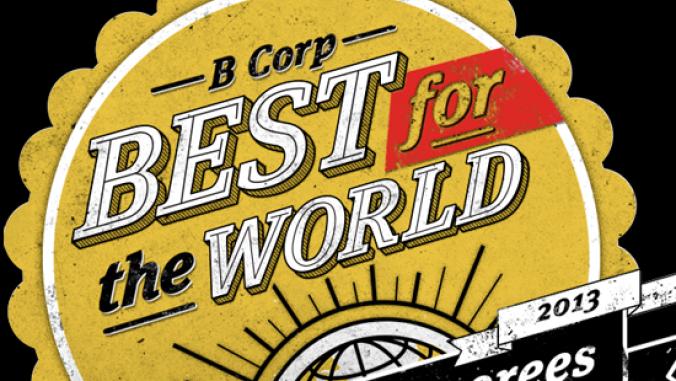ICYMI: Green businesses really are more profitable
<p>In case you missed it: Green goods boosted small businesses, a GMO mystery deepens, ranking the greenest utility companies, and five things every company should be doing.</p>

ICYMI (In Case You Missed It) is a regular Monday feature recapping the latest news in corporate sustainability.
Dear readers: It's been another busy week in the green-business world: World Environment Day happened Wednesday, not that you (or I) celebrated or even realized it; there was a tremendously interesting story about "rogue" GMO wheat cropping up in Oregon; and there were some big achievements on carbon capture, food waste and more.
Also, I'll make up for last week's near-total lack of an "Odds 'n' Sods" section by starting this week's ICYMI off with the unclassifiable -- but highly interesting -- news from around the green world.
Odds 'n' sods
• EV charging for fun and profit: A new report from the Deloitte Center for Energy Solutions finds that public car-charging facilities are a much-needed step to expand electric-vehicle adoption and -- more important -- could be quite profitable for the companies providing chargers. Jim Motavalli has a rundown of the five top-level findings at PlugInCars.com.
• Maybe green businesses really are doing better: You know all those consumer surveys suggesting that consumers can, will and do spend more for green products? (Oh hey, here's yet another one!) Those never seemed to hold any water. But a new report from Green America finds that green businesses actually may be doing better, and as a result of those same irrationally exuberant consumers: In a survey of more than 1,300 small businesses, 79 percent "strongly agreed that offering green products and services gave their businesses a competitive advantage."
• A new tool for employee engagement: Getting your employees on board with building a culture of sustainability, particularly in large, globe-spanning firms, can be a tall order. PracticallyGreen this week launched a new platform to help do just that. Among the PG clients using the platform already are Unilever, NBCUniversal, Sony and Caesar's Entertainment. The company also announced the addition of former Google energy czar Bill Wiehl to its board of directors.
Piggy bank photo by Elnur on Shutterstock.
• Who are the greenest utility companies? Following in the footsteps of the EPA's Green Power Partnership, the National Renewable Energy Lab has ranked the nation's utilities for their adoption of clean energy. Portland General Electric took the top spot from Austin Energy last year, with more than 834,000 megawatt-hours of renewable energy sold. Portland General Electric also boasted the highest number of customers using its clean energy (almost 88,000); meanwhile, Waterloo Utilities in Wisconsin generates the largest slice of its load from renewables, 23.9 percent.
GMOs: A sticky mess gets stickier
I've been interested in genetically modified food for a long time, since the early days when it held limitless potential for improving yields, increasing nutrition and reducing farm inputs. Since those salad days, of course, GMOs largely have shaped up to be profit-generating mechanisms for big biotech companies -- and outrage-generating mechanisms for large chunks of the global population. So it was extremely interesting to watch the whole "rogue GMO" story take shape during the past week.
First, if you weren't watching, the USDA found Roundup Ready wheat on a farm in Oregon late last month. This is wheat designed to be resistant to Monsanto's Roundup (glyphosate) herbicide -- and which never was approved for planting.
Panic ensued as the anti-GMO countries (and big U.S. trading partners) Japan and South Korea suspended U.S. wheat imports. Farmers sued Monsanto for the loss of trade.
As the news unfolded, the "mystery deepens" about how that wheat ended up in the Oregon field. Monsanto says it ended its Roundup Ready wheat research nine years ago -- and the lawyers for the Oregon farmer said the field never was used for GMO research.
Agriculture Secretary Tom Vilsack, in a move meant to calm the nerves of anti-GMO countries and consumers, said that the "rogue wheat" was found in just the one field and that larger contamination was neither found nor suspected. Monsanto's CTO on Thursday floated the idea that "sabotage" was behind the outbreak. That's where the mystery stands today.
Meanwhile, in slightly related news, Connecticut this week became the first state to pass a GMO labeling bill, although it won't take effect until four other states pass labeling laws, with one state bordering Connecticut and all of them totaling at least 20 million residents. The International Business Times describes an "army of lobbyists," led by Monsanto, as being the driving force behind the delay clauses in Connecticut's bills.
Notable goals and achievements
I almost called this section another "Odds 'n' sods" for the heck of it, but we'll stick with tradition and label this correctly. Here are some of the latest results and promises from the business world:
• Government, industry team up to tackle food waste: The USDA and EPA this week launched the U.S. Food Waste Challenge, an effort to raise awareness about food waste and get consumers -- along with its planned 400 partners across the food supply chain, including growers, producers, processors and retailers -- to reduce food waste. General Mills announced its participation in the challenge, setting a goal of reducing waste by 30 million pounds by making it easier to donate ingredients and packaging to Feeding America, the national food-bank network.
• AB InBev steps up environmental commitments: Global beverage giant AB InBev this week made a number of big commitments, including a pledge to reduce packaging materials by the equivalent of 250 million beer cans, reducing the energy and carbon intensity of its production by 10 percent.
• Carbon-capture project shows good results: Although carbon capture and storage isn't a long-term climate solution (while transitioning to renewables is), there's a place for reducing the emissions from the current stock of dirty power plants. Cleantech firm Akermin this week announced that its Wilsonville, Ala., plant has been capturing 90 percent of the carbon dioxide the plant generates for the past several weeks.
• Hotel chains standardize carbon measurement: In order to make it easier for corporate and individual travelers to accurately compare the carbon footprint of their lodging choices, 23 hotel chains have joined together to create a standard measurement, the Hotel Carbon Measurement Initiative.
• Plan A continues bringing in the quid: Marks & Spencer's Plan A sustainability plan continues to save the company significant cash: According to the latest update, Plan A earned almost $210 million in savings in the last year, up 29 percent over the previous year.
• USPS continues its recycling success: In one of the very few World Environment Day-themed releases I saw this week, the U.S. Postal Service provided the latest update on its recycling programs results. In 2012, the agency diverted 48 percent of its solid waste from landfills, an increase of 2 percent over last year. That equals 186,000 tons of paper, 35,000 tons of cardboard, 6,000 tons of plastic and 21,000 miscellaneous tons.
I'll leave you with a really interesting think piece on ThinkProgress by Auden Schendler and Michael Toffel: Corporate Sustainability Is Not Sustainable. In it, the authors write:
“Green business” as currently practiced focuses on limited operational efficiencies -- cutting carbon footprint and waste reduction -- and declares victory. But these measures fail to even dent the climate problem. And the proof is easy: greenhouse gases emissions continue to rise.
The post also highlights the five things companies should be doing to take meaningful action on climate. It's well worth a read in full.





